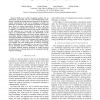Free Online Productivity Tools
i2Speak
i2Symbol
i2OCR
iTex2Img
iWeb2Print
iWeb2Shot
i2Type
iPdf2Split
iPdf2Merge
i2Bopomofo
i2Arabic
i2Style
i2Image
i2PDF
iLatex2Rtf
Sci2ools
135
click to vote
PERCOM
2011
ACM
2011
ACM
Is ontology-based activity recognition really effective?
—While most activity recognition systems rely on data-driven approaches, the use of knowledge-driven techniques is gaining increasing interest. Research in this field has mainly concentrated on the use of ontologies to specify the semantics of activities, and ontological reasoning to recognize them based on context information. However, at the time of writing, the experimental evaluation of these techniques is limited to computational aspects; their actual effectiveness is still unknown. As a first step to fill this gap, in this paper, we experimentally evaluate the effectiveness of the ontological approach, using an activity dataset collected in a smart-home setting. Preliminary results suggest that existing ontological techniques underperform data-driven ones, mainly because they lack support for reasoning with temporal information. Indeed, we show that, when ontological techniques are extended with even simple forms of temporal reasoning, their effectiveness is comparable to th...
Computer Networks | Hidden Markov Models | Ontological Approach | PERCOM 2011 | Temporal Reasoning |
| Added | 21 Aug 2011 |
| Updated | 21 Aug 2011 |
| Type | Journal |
| Year | 2011 |
| Where | PERCOM |
| Authors | Daniele Riboni, Linda Pareschi, Laura Radaelli, Claudio Bettini |
Comments (0)

